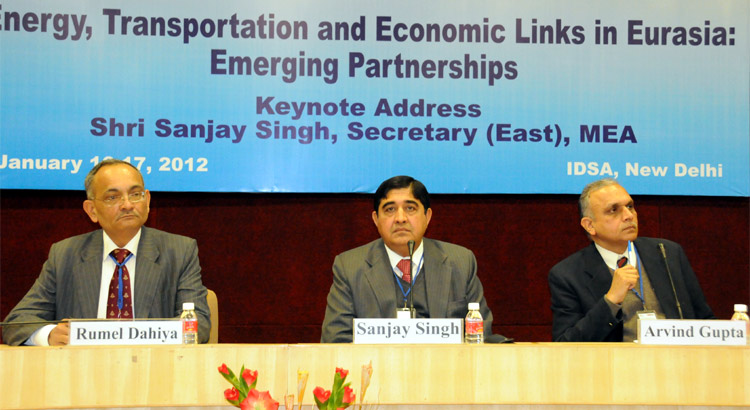You are here

The inaugural address was delivered by the Director General of IDSA, Dr. Arvind Gupta. He elaborated on the importance of Eurasian region as a ‘heartland’ and a ‘pivot’ of the world in geopolitical terms and emphasized on the need to revive old cultural links between India and Central Asia. Given the strategic location of Central Asia and the vast natural resources that the region is endowed with, the region is of huge geopolitical significance. Dr. Gupta dwelled on the simultaneous existence of convergence and competition between various external powers who have been trying to gain a foothold in the region. This has led to the emergence of a new configuration of interests in the region.
Mr. Sanjay Singh highlighted the geopolitical and economic significance of the Eurasian region especially in the context of energy, connectivity and economic linkages. The region as a bridge between Europe and Asia can help to improve development and connectivity across the wider region. He dwelled on India’s historic partnership with USSR as one of the most important relationships in the 21st century. India and Russia have continued to maintain a strong and stable relationship which has now been elevated to a ‘special’ and ‘privileged’ status. He shed light on India’s growing engagement with Central Asia and described it as a key emerging feature of the country’s foreign policy. India is keen to revive its ancient trade and transit links with the region, across the extended neighbourhood of Afghanistan, Eurasia, Iran and on to Turkey. India has also sought to develop its ties with Ukraine, Belarus, Armenia and Azerbaijan by enhancing economic content of the bilateral relationship. Mr. Singh argued that Iran, with which India has civilizational ties, plays an important role in improving connectivity between India and Eurasia and efforts are being made to realize the true potential of the International North South Transport Corridor (INSTC). He highlighted India’s long term commitment towards stability of Afghanistan and felt that both India and Central Asian states have a common security stake in ensuring stability of the region. Afghanistan is a bridge between Central and South Asia with three of the five Central Asian Republics sharing a common border with the country. India is interested in formation of long term energy partnerships in the region in addition to the more meaningful, diverse and broader economic cooperation in areas like IT and pharmaceuticals areas in which cooperation has been expanded in the recent past. However, the major challenge of India’s engagement with Central Asia is the issue of connectivity. Land routes passing through geographically and politically inhospitable terrain and lack of direct surface transport routes have prevented the realisation of true potential of the economic relationship. Therefore, it has become imperative to discuss viable connectivity options. Mr. Singh assured the Government of India’s commitment towards reinvigorating connectivity in the region, by contributing to its infrastructure, with the eventual aim of growth with stability and security for all the countries.
Brig (Retd) Rumel Dahiya, DDG, IDSA, thanked the panellists and the organisers of the conference. He re-emphasised the vital importance of the Eurasian region for India and added that India continues to prefer a multi dimensional relationship which encompasses improved trade, greater people to people contact and the establishment of a cooperative security framework in this region.
